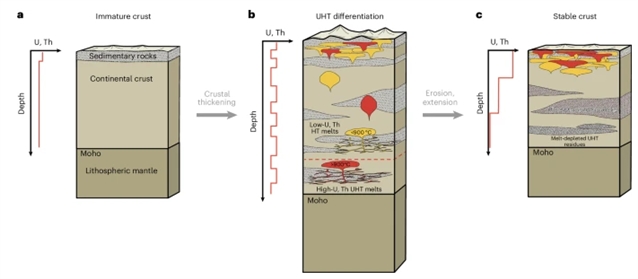
近日,美国宾夕法尼亚州立大学Andrew J. Smye团队研究了稳定大陆的超热起源。该研究于2025年10月13日发表在《自然—地球科学》杂志上。
地球上富含硅的大陆陨坑的起源和组成,特别是下陨坑,仍然不确定。稳定的大陆陨坑,包括2亿年以上的克拉通和陨坑,其特征是上陨坑富集放射性成因热元素(U、Th、K),下陨坑亏缺。由于下部砾岩可能由50%的铝组成,它们是变质沉积岩和演化后的变质新沉积岩,最初都富集于U型和Th型,大陆分异需要一种将这些元素向上转移的机制。
研究组对部分熔融的变质沉积岩和变质新沉积岩进行了分析,结果表明,超高温 (>900°C) 对于分层产热和稳定晶体是必不可少的。除去由无流体熔炼产生的一小部分超高温熔体,可以产生观察到的U和Th的低熔点损耗。相比之下,由于独居石对花岗岩熔体溶解的弹性,低温熔融不能驱动分异。该发现确立了超高温熔融是稳定大陆形成的重要标准,为克拉通的形成、超高温变质地形和超大陆旋回之间提供了直接联系。这一认识限制了形成成岩分异的构造背景。
附:英文原文
Title: Ultra-hot origins of stable continents
Author: Smye, Andrew J., Kelemen, Peter B.
Issue&Volume: 2025-10-13
Abstract: The origin and composition of Earth’s silica-rich continental crust, particularly the lower crust, remain uncertain. Stable continental crust, including cratons and crust older than 200 million years, is marked by enrichment of radiogenic heat-producing elements (U, Th and K) in the upper crust and depletion in the lower crust. Because the lower crust probably consists of >50% aluminous metasedimentary and evolved metaigneous rocks—both initially enriched in U and Th—continental differentiation requires a mechanism to transfer these elements upwards. Here, in our analysis of partially melted metasedimentary and metaigneous rocks, we show that ultrahigh temperatures (>900°C) are essential to stratify heat production and stabilize crust. Removal of small fractions of ultrahigh-temperature melt generated by fluid-absent melting can produce the observed lower-crustal depletions in U and Th. By contrast, lower-temperature melting fails to drive differentiation owing to the resilience of monazite to dissolution in granitic melts. Our findings establish ultrahigh-temperature melting as an important criterion for the formation of stable continents, providing a direct link between the formation of cratons and ultrahigh-temperature metamorphic terrains and the supercontinent cycle. This insight constrains the tectonic settings responsible for crustal differentiation.
DOI: 10.1038/s41561-025-01820-2
Source: https://www.nature.com/articles/s41561-025-01820-2
